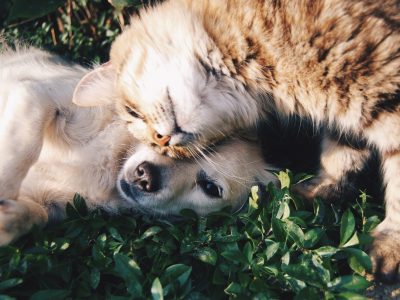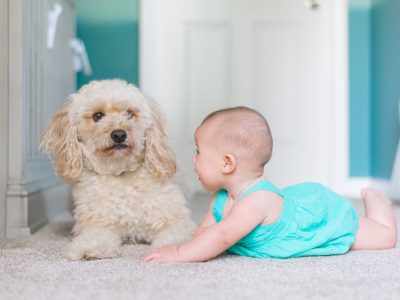How to Cope with Losing a Pet
Losing a pet can be devastating. Pets become a part of our families, and we love them just the same. Studies show that “pet owners have the tendency to humanize their pet and perceive animals no differently from humans in terms of emotions, needs, and legal rights.” The research also showed that a pet’s death could hurt a person the same as losing a spouse or even a child. Some may wonder “Why are animal deaths sadder than human deaths?” With all this being said, the death of a pet is a significant loss. Grieving a pet and learning to cope is important for all pet owners.
Dealing with loss can be challenging, no matter who passed away, human or animal.
Many people may downplay the death of a pet. Wrongly, they say things like “it’s just an animal” or “at least it wasn’t a person who died.” These phrases and ideas can be very hurtful and invalidating to people who lost their pets. Whether you lost a tiny fish in your tank or a dog that has grown up with you, the loss is still impactful. Don’t let anyone tell you that your feelings do not matter because they do!
Spreading love in this world is a great gift we can give all beings. The love that you have your animal matters and you need time to grieve and heal from the loss. This article will go over the grieving process of losing a pet and give you ways to cope. If you are interested, keep reading!

The Benefits of Having Pets
Having pets can be very beneficial to humans. As mentioned in our previous article, spending time with pets can help people reduce stress and feel happier. In the rough times, you’ve faced, think of your comfort when cuddling with your cat or petting your dog. Your pet provided a warm presence to the house and filled it with more joy.
Every kid begs their parent for a pet at one point in their lives. Think back to the first pet you ever had. Many of us usually start off with a pet fish. People get fish from many different places like pet stores or even as prizes at county fairs. Remember how excited you were when you brought that pet home and put it in its tank or bowl. You named your fish, watched them swim in the water, fed them their food, and appreciated their presence in your life.
The Psychological Benefits – Pets Help with Emotional Support
Pets can come to the emotional rescue. Research consistently shows great benefits of pets to the elderly, children, and basically everyone. Not only can pets provide companionship, loyalty, unconditional love, but they help to reduce stress, anxiety, and depression.
Studies show that kids can benefit a lot from having pets. According to the AACAP, positive experiences with pets can improve children’s self-esteem, self-confidence, trust, empathy, and communication skills. Children learn to take care of pets and have responsibilities when regarding their needs. Statistics show that 55% aged 50 to 80 have a pet – many people reported that pets lessen stress and give the owners a purpose in life.
The Cognitive Benefits – Pets Help to Improve Brain Power
Research shows that contact with pets can help with positive memories. This is especially helpful for the elderly with cognitive impairment such as dementia and stroke. In addition, talking to pets, taking care of them can help the elderly to pay attention to details and improve cognitive functioning.
According to the ASPCA, about 6.3 million “companion animals” are taken to animal shelters in the United States yearly. About 920,000 of those animals are euthanized annually. When you adopt an animal and bring them into your family, you dedicate yourself to providing a better, more loving life for these animals. Many people love their animals like their “fur babies” or own children – and that is why it is even more devastating when their pet passes on. They start wondering how to cope with losing a pet, because it all is very overwhelming!
What Losing a Pet is Like
Losing a pet can be just as painful as losing another family member. Every day, you see people proudly wearing shirts that say “Dog Mom” or sipping from cups that say “Proud Cat Lady.” People’s love for their pets is meaningful, and the loss they feel is significant when the animal passes away.
Losing a pet can be an adjustment, to say the least. When the pet passes away, your house feels different. If you had an energetic dog, you would miss the sound of their bark or the jingle of their collar as they ran by. You’d miss how your cat climbs onto furniture and looks cute while taking the cat naps. Overall, you will feel the loss of a pet.
Remember that it is okay to feel sad after your animal passes away; it is normal and expected. Those who downplay the significance of what that animal meant to you are wrong. Many people don’t have kids or are not able to have kids and consider their animals to be like their children. Many children with no siblings grew up with their dog or cat by their side – when the animal passes, they feel like they lost a sibling or lifelong companion.
It’ll take some time to get used to the empty space, but that is okay. You are entitled to feel what you feel and grieve your emotions. Healing takes time – this article will go over how to cope with losing a pet.

How to Cope with Losing a Pet
1. Admit That You Are Not Okay
Sometimes we do not feel okay, and that’s okay! As mentioned before, no one should make you feel wrong or silly for feeling the way you do. The loss of a pet can be very emotional, upsetting, and heartbreaking. Take time to identify your feelings and not disregard them. A great way to do this is through journaling and journal prompts.
Here are some journal prompts to help you explore your feelings and identify what you were going through:
- How do I feel right now?
- What emotions do I identify with?
- What would make me feel better right now question?
- Who can I lean on for support?
- Name five memories you had with your animal that you will never forget.
- Who can I ask for advice on how to cope with losing a pet?
2. Go Through The Grieving Stages
As mentioned in our past article, in times of significant loss, Psychiatrist Elisabeth Kübler-Ross says that people go through 5 stages of grief. These stages are denial, anger, bargaining, depression, and acceptance. You may be able to relate to some or all of these stages of grieving your pet.
Stage 1. Denial Over Your Pet Dying
It may be hard to believe that your pet is really gone. You look at your Holiday cards with them or their old toys and think, “I can’t believe this is happening; this isn’t real.” Sometimes when it is too painful to face reality, people go into denial in an attempt to postpone or avoid their grief.
Stage 2. Anger Over Losing Your Pet
It doesn’t feel fair! Why do pets have to die? Why can’t pets live long lives as humans do? It is all very upsetting and, frankly, angering to think about. You may be angry that your pet got sick, that there was nothing you could do, or that your family has to go through the pain of the loss.
Anger can be uncomfortable, but it provides enough internal discomfort to work through this loss and grief. This anger can be the beginning of a proactive change for the better.
Stage 3. Bargaining Over the Loss of Your Pet
In this stage, you may be trying to negotiate a plan with a God, a higher power, or fate to stop this loss from occurring. You try to make compromises so that this pain won’t happen again. In this situation, you may bargain with the intention that your other pets will hopefully live longer and healthier lives. Bargaining helps you to gain some control over the situation, even if there really is nothing you can do.
Stage 4. Depression About Your Loss
A pet’s death can be unfortunate and overwhelming – this can cause you to feel down about yourself and life. You may feel sad, hopeless, tired, and isolate yourself from others. Your sleep and appetite can be a problem; Research shows that a pet’s death can make someone have a negative view of life.
Stage 5. Acceptance of Your Pet’s Passing
In the final stage of grief, you will detach or resign from this grief. It doesn’t mean that you will not miss your pet anymore. In reality, you are just trying to move on with your life and find inner-peace once more.
Remember, the grieving stages may not be linear, and you may relapse. You may feel fine one moment and then find yourself back in one of these stages. These experiences are totally normal and part of your healing process.
3. Take Your Time to Heal
Some people want to get a new pet right after their animal passes away. Others need more time to heal and grieve before doing so. Follow what makes you feel comfortable and what you feel ready for.
Getting another pet is a big commitment, as you know from raising and caring for your last animal. Take your time and wait until you feel ready to make that important decision.
You may need time to approach your kids or younger family members with the loss of your family pet. It can be challenging to talk to kids about the passing away, especially their beloved pet. Kids might not understand where their pet went or why it was sick. They wish things were different and they could have their favorite dog, cat, etc., forever.
Some of our tips:
- Use children’s books that allow kids to read/listen to stories about the passing of a pet understandably and tangibly
- Show kids episodes of children’s shows that address this topic (like the episode of Sesame Street when Mr. Hopper passes away), so they have a better understanding of what has happened
- Allow them to express their emotions and provide a safe place to comfort them and validate their feelings
- Reminisce with them and bring up fun or happy moments they had with their pet
4. Lean on support
Whenever we are grieving, we can benefit from leaning on support and going to people who understand us. Social support helps us feel understood and less alone in this world. Turn to people you know who will recognize how you feel and make your feelings valid. Leaning on someone who has already lost a pet can also be helpful. They can give useful advice, share ways they coped, and help you feel seen/heard.

5. Go to Places Where Animals Are And Spend Time in Nature
If you don’t feel ready to get another pet just yet, you can always spend time with animals in different ways. There are plenty of Cat Cafés or places that allow you to spend time with animals.
You can go to the park or go for a walk – there is so much wildlife to see, and you may not even realize it. You can hear the birds chirping on your walk, see the squirrels running, see people walking their own pets (which might be a bit challenging for you to see), and appreciate the nature around you. If you feel lonely, ask a friend from your support system to accompany you and socialize while seeing the animals and getting fresh air.
6. Appreciate The Time you Had With Your Pet
Although it can be painful, especially when thinking of the last moments of your pet’s life where they may have been in pain, there are many memories that you had with your pet that you will never forget. You may think back to when you first brought your pet home to your kids or dealt with a breakup and your cat laid with you while you cried. Cherish these memories – try journaling about them or writing them down to reflect on when you miss your pet. Even though your animals passed, the memory and love they shared with you will never fade away.

7. Consider Therapy
Therapy can help people grieve significant losses in their lives. If you feel like you are struggling with the loss of your pet or anyone else in your life, a therapist can support you. Therapy enables you to cope, find healthy ways to deal with loss, and heal. Therapy provides a safe place to talk about your feelings and express your emotions with a trained professional who understands what you’re going through – this is a healthy option that allows you to learn how to cope with losing a pet.
Therapy can also help people who face depression. As mentioned before, grief can make people enter stages of depression. For some people, such sad and depressive feelings could persist for a long time. If you also withdraw from others, constantly have negative thoughts about yourself, others, and the world, lose interest, stop engaging in life, or even have suicidal thoughts, you may be facing clinical depression that requires treatment.
If you feel depressed, our team at Mind Connections wants to support you! Call to set up a FREE 15-Minute consultation today and get the help you deserve.
Content Creator, Victoria Gallo; Reviewed by Dr. June Cao



It’s so sad that some people just do not see how my dog was part of my family and life. I certainly appreciate your blog.